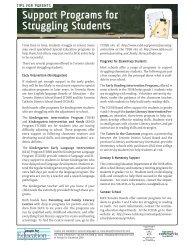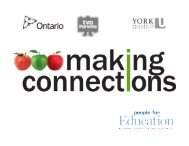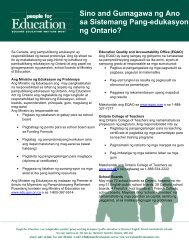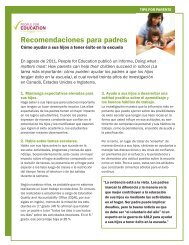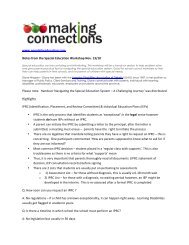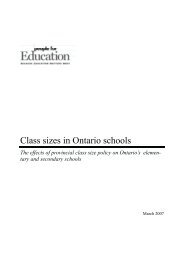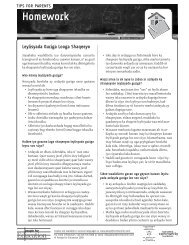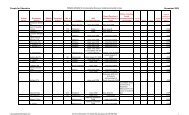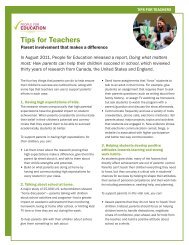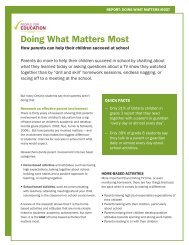Our Children Our Future Our Vision - People for Education
Our Children Our Future Our Vision - People for Education
Our Children Our Future Our Vision - People for Education
Create successful ePaper yourself
Turn your PDF publications into a flip-book with our unique Google optimized e-Paper software.
<strong>Our</strong> <strong>Children</strong>, <strong>Our</strong> <strong>Future</strong>, <strong>Our</strong> <strong>Vision</strong><br />
s. 27 of the Canadian Charter of Rights and Freedoms. 84.2% of respondents were in full / overwhelmingly<br />
in agreement with this statement, with only 5.7% in total /some disagreement.<br />
COMMENTS: There were 59 comments in this category, which were coded under the major themes<br />
of Language & Identity (15), Curriculum Embedded (6), Language Nests & Immersion Programs (3),<br />
Home & Community Connections (4), and General Comments (32).<br />
The majority of respondents commented on the importance of language and the connection to a<br />
student’s identity (15), noting that “denying this as a part of education is equivalent to ethnocide,”<br />
with one responding that after the federal government’s apology <strong>for</strong> residential schools, that “they<br />
took our languages and culture, they should help us get it back.”<br />
Other comments included “our languages make up who we are as a people,” and “our language<br />
is our education and perspective of the world around us.” General Comments (33) ranged from<br />
thanking teachers “<strong>for</strong> all of your dedication and hard work protecting and revitalizing our Native<br />
languages,” to one respondent’s personal reflection, who stated “I am a 34 yr. old and I do not<br />
know how to speak Ojibwe. I think there is something very wrong with that.”<br />
9. Legislation<br />
Q1: The Indian Act (Sections 114-121 refers to education) is out of step with the realities found in<br />
First Nations schools. 68.1% of respondents were in full / overwhelmingly in agreement that the<br />
Indian Act was out of step with the realities found in First Nation schools, with 22.4% responding<br />
that they had no opinion.<br />
Q2: A federal “First Nations <strong>Education</strong> Act” is needed to address the inequities in school systems<br />
on reserve. In the area of enacting new legislation under a First Nations <strong>Education</strong> Act to address<br />
the inequities, 73.3% were in full / overwhelmingly in agreement with the statement, only 8.6%<br />
were in total / some disagreement, while 18.1% had no opinion either way.<br />
Q3: First Nations must continue to urge the federal government to adopt the principle of free, prior<br />
and in<strong>for</strong>med consent when designing and implementing legislative measures that affect them.<br />
This question addressed consent and consultation with First Nations regarding any changes to<br />
legislation, with 80.8% in full / overwhelmingly in agreement with the statement, while 13.3% had<br />
no opinion either way.<br />
COMMENTS: Due to an omission during the design of the survey <strong>for</strong> the on-line version <strong>for</strong> SurveyMonkey©,<br />
a comment box was not included <strong>for</strong> this category. However, respondents had the<br />
opportunity to make any additional comments on all of the categories in the final section of the<br />
survey.<br />
Chiefs of Ontario<br />
70



